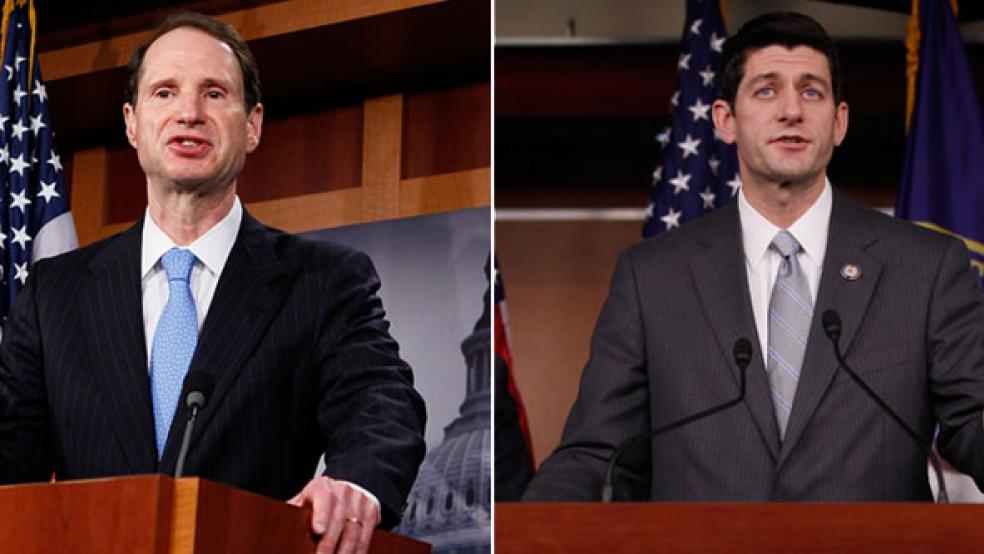Last spring, the House passed on a straight party-line vote Rep. Paul Ryan’s mandatory Medicare privatization plan, which the Congressional Budget Office said would force future seniors to pick up two-thirds of their health care costs with no guarantee that those costs would come down.
On Thursday, Ryan, R-Wis., with a bipartisan boost from Sen. Ron Wyden, D-Ore., offered a revamped version of his plan, dubbed premium support because the government gives beneficiaries cash or a voucher to help them pay for plans sold by private insurance companies. The changes from his earlier plan were stark.
Choosing a private plan would no longer be mandatory; traditional Medicare would still be an option. Overall costs for Medicare would be capped at the same level now mandated by the Patient Protection and Affordable Care Act (dubbed Obamacare by its opponents), not at the far lower rate of inflation Ryan used in his previous plan. And his latest plan would forbid premium increases for low- and moderate-income seniors unless Congress intervened.
There’s more. State based exchanges – should they survive Republican efforts to repeal reform – will not be asked to regulate and oversee insurers that sell these new Medicare plans. Nor would there be a national exchange to ensure the plans meet all the guarantees contained in the Ryan-Wyden proposal, which include no discrimination for pre-existing conditions; higher premium support levels for sicker seniors; and a minimum set of benefits comparable to current Medicare coverage. Instead, the plan, which wouldn’t go into effect until 2022, requires the Medicare bureaucracy to administer all the new rules – the same bureaucracy that many Republicans until recently blamed for most of the system’s woes.
When asked if he still supported repeal of health care reform, Ryan said, “Absolutely.” The irony wasn’t lost on one of the original architects of the premium support idea in the 1990s. “There is something truly weird when guys like Ryan want to repeal the Affordable Care Act, but then take a population twice as big and twice as hard to handle and put them in the same administrative framework,” said Henry Aaron, a senior fellow at the Brookings Institution and one of the nation’s leading health care experts.
Ryan’s retreat isn’t hard to explain. The reason is politics. Democratic challengers running for Congress next year have been chomping at the bit to go after Republican House members who voted in favor of Ryan’s original plan, which passed on a straight party-line vote. “It repositions Ryan in a major way since his previous position was attacked as destroying Medicare and this cannot be,” said Alice Rivlin, a one-time Democratic head of the CBO now at the Brookings Institution who co-authored a premium support plan with former Republican Senator Pete Domenici that is very similar to the Ryan-Wyden plan.
Incumbent Republican moderates, perhaps suffering from a severe case of buyers’ remorse, can now point to bipartisan support for this updated version of the Ryan plan, which can more easily be sold to seniors than the earlier plan. However, Tea Party-backed conservatives may attack Ryan for selling out his principles and endorsing Obamacare-style Medicare privatization. When Bill Hoagland of the Bipartisan Policy Center at an early morning unveiling of the plan noted that both sponsors would face opposition within their respective caucuses, Wyden immediately chimed in, “Ya think?”
Neither Wyden nor Ryan held out any hope that the plan would receive serious discussion on the Hill during the coming election year. And it is not at all clear that plan would win broad bi-partisan support in a post-election setting. Even as it was being unveiled, differences quickly emerged on how it would control costs, which is the only reason to tinker with Medicare in the first place.
For instance, the plan calls for capping annual growth in government spending on the program at the rate of growth of the domestic economy (gross domestic product or GDP) plus one percent. Sound familiar? It should. It is the same formula that is now part of the health care reform law.
However, Ryan-Wyden doesn’t depend on the much-vilified Independent Payment Advisory Board – dubbed “death panels” by Republicans in the run-up to their victorious 2010 election –to identify ways of saving money whenever the growth rate exceeds GDP + 1 percent. Instead, it would kick the can directly over to Congress to come up with the savings.
What might Congress do? “Cut provider reimbursements,” Wyden offered. “Let’s look at the increases in prescription drug prices, in device prices. There are lots of other things.” Countered Ryan: “Maybe the premium hikes should be more on wealthier seniors.”
In other words, the latest plan to save Medicare for future generations depends on competition between insurance companies to control costs. And if it doesn’t, future Congresses will step in to debate the best way to administer the pain.
Sound familiar?





